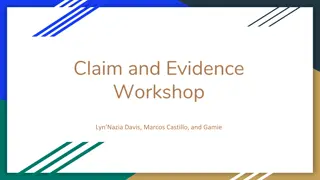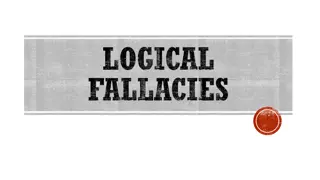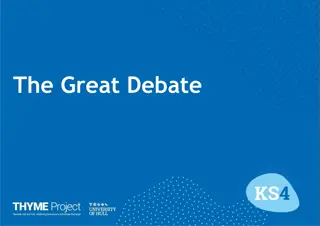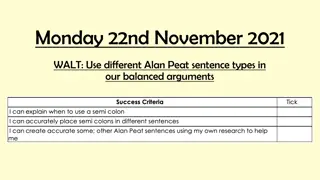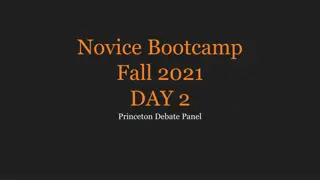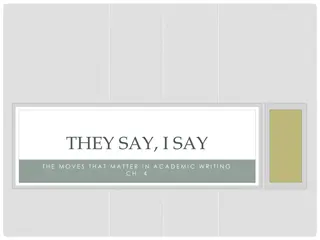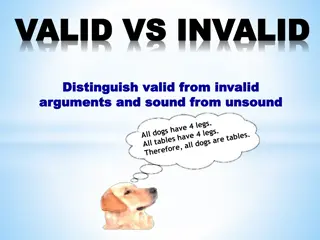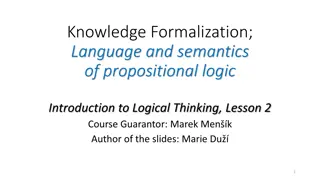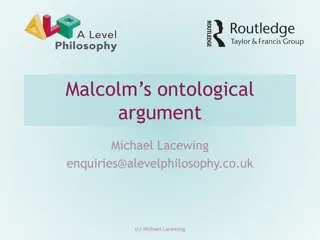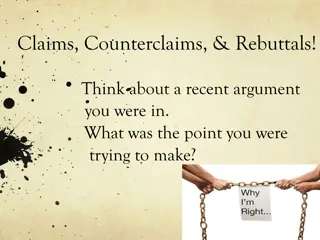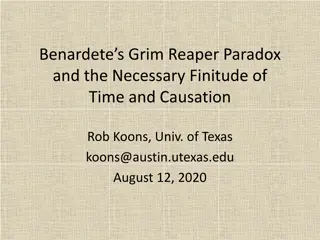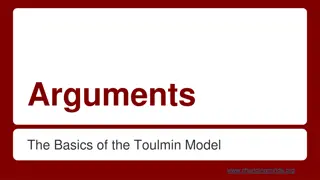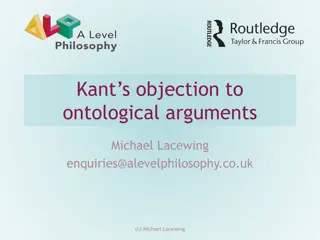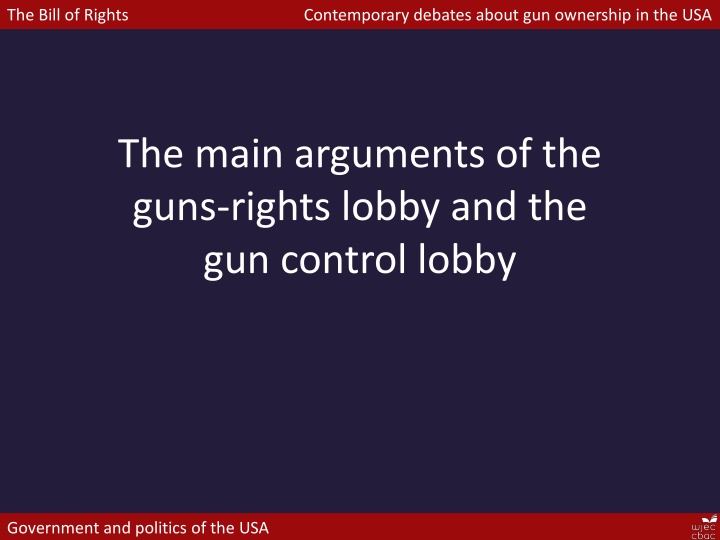
Debates on Gun Ownership in the USA: Younge's Insights
Explore the contemporary debates surrounding gun ownership in the USA through the lens of Younge's analysis. Delve into the contrasting viewpoints of the gun-rights lobby and the gun control lobby, shedding light on the nuances of American attitudes towards gun violence and political inaction.
Download Presentation

Please find below an Image/Link to download the presentation.
The content on the website is provided AS IS for your information and personal use only. It may not be sold, licensed, or shared on other websites without obtaining consent from the author. If you encounter any issues during the download, it is possible that the publisher has removed the file from their server.
You are allowed to download the files provided on this website for personal or commercial use, subject to the condition that they are used lawfully. All files are the property of their respective owners.
The content on the website is provided AS IS for your information and personal use only. It may not be sold, licensed, or shared on other websites without obtaining consent from the author.
E N D
Presentation Transcript
The Bill of Rights Contemporary debates about gun ownership in the USA The main arguments of the guns-rights lobby and the gun control lobby Government and politics of the USA
The Bill of Rights Question 1: Why does Younge think that the high numbers of gun deaths every day in the USA have relatively little impact on Americans? Contemporary debates about gun ownership in the USA Passage 1: Those shot on any given day in different places and very different circumstances lack the critical mass and tragic drama to draw the attention of the nation s media in the way a mass shooting in a cinema or church might, Younge writes. These deaths are white noise set sufficiently low to allow the country to go about its business undisturbed: a confluence of culture, politics, and economics that guarantees that each morning several children will wake up but not go to bed while the rest of the country sleeps soundly. In this regard, Younge continues, America really is exceptional. American teens are seventeen times more likely to die from gun violence than their peers in other high-income countries. In the United Kingdom, it would take more than two months for a proportionate number of child gun deaths to occur [as occur every day in the United States]. And by the time I d come to write this book, I d been in the country long enough to know that things were exponentially worse for black children like my own. The United States, he argues, is a wealthy, Western country that has settled, legislatively at least, on a pain threshold that is morally unacceptable. Suggested response: Because Americans are used to hearing about such deaths. They are not unusual and most are not mass shootings in public places but individuals at home or on the street. The frequency and lack of impact of this means that Americans are used to it and see it as white noise . He also suggests that white Americans are less affected by the deaths of blacks (who are statistically more likely to be victims) and that the level of acceptance of gun deaths in American society as a whole is morally unacceptable. Question Suggested response Government and politics of the USA
The Bill of Rights Question 2: Explain how Younge is saying that politics in America is failing on the issue of guns in this passage. Contemporary debates about gun ownership in the USA Passage 2: Younge: I was sent to Florida to write about [President] Obama. He was set to give a speech and the Aurora [movie-theatre] shooting happened. I can t remember exactly what he said but it felt like what American presidents say: Now is not the time for politics. Everybody go home and hug their children. Let s all be together now. This is a tragedy. I remember thinking that was wrong: This is during an election and people have been killed, this is not a one-off, it seems exactly like the time for politics to me where you might talk about this because something can be done about it. I remember thinking nothing can change if nobody s going to talk about it. Then, within [five] months, came [the school shooting at] Sandy Hook. And I was struck that [Obama] did say something about it. Of course, Sandy Hook was after the election. He says, We can t go on like this. I m thinking, well, one of the reasons America does go on like this is because nobody wanted to talk about it. elections. Suggested response: He is suggesting that politicians are not brave enough to tackle the issue head-on, they avoid it and they are too concerned about how taking the moral high ground against guns will affect their polling at Question Suggested response Government and politics of the USA
The Bill of Rights Question 3: Explain the argument Younge says Americans use when they make an almost vigilantist appeal . Contemporary debates about gun ownership in the USA Passage 3: I went to my first [National Rifle Association] convention in 2012 in St. Louis. I would say, I m British. I don t understand this (which was true). Explain it to me. The first thing they would say is, Are you married? Do you have children? Imagine someone broke into your house. What are you going to do? You re going to just sit there and wait for the police? It was this brazen appeal to masculinity. It wasn t anti-government, but [the notion was] you wouldn t want to rely on your government for that. [It was an] almost vigilantist appeal ..There was also this [argument] about citizenry holding people to account this notion of it being this peculiar American thing. A couple of people were like, You have a queen. You re a subject. We re citizens and we had a revolution. government that underpins American politics (since the Declaration of Independence) that government has fewer powers and rights than citizens individually do; that citizens have the right to act when they feel threatened, and not be told by government what their reaction and actions should be. Suggested response: He is referring to the notion of a weak federal Question Suggested response Government and politics of the USA
The Bill of Rights Question 4: Explain how the fact that gun (and allied goods like ammunition) production, sale and ownership is an industry affects how difficult it is to control it. Contemporary debates about gun ownership in the USA Passage 4: [I was also struck by] just seeing people in the big, cavernous hall eyeing the goods, pointing these guns into mid-air. I [was] seeing what an industry it is. There s a lot of money in there, and people liked the gear in a way that people might if [they were] going to a tractor show or something. You couldn t not be aware of the racial demographics, which were basically white guys. Suggested response: There are jobs and businesses that would stand to lose out a lot if guns were severely regulated; a whole sector of the economy would suffer; making money without regulation is a cornerstone of American culture; money means campaign and candidate financing at elections. Question Suggested response Government and politics of the USA
The Bill of Rights Question 5: How does the interviewer (Friedman) explain the reaction Americans have to violent incidents (compared to the opposite reaction in Australia)? Contemporary debates about gun ownership in the USA Passage 5: Friedman: When I spoke to the Australian foreign correspondent Zoe Daniel, she mentioned that, in covering politics in the U.S., she at first couldn t understand why gun-control measures weren t being implemented. Now she s come to understand that people believe guns are for their personal protection. So every time there s a violent incident, it encourages more people to have a gun. Whereas in Australia, after their worst gun-related massacre 20 years ago, everyone decided that people shouldn t have guns. Australians had the exact opposite response. Suggested response: Friedman emphasises that each violent incident confirms many Americans belief that their personal safety is in jeopardy and that more guns are needed to protect that whereas Australia had a more communitarian and shared revulsion against guns. This probably also reflects the fact that mass shootings are far more uncommon in Australia and the central government is stronger. Question Suggested response Government and politics of the USA
The Bill of Rights Question 6: Explain what Younge is referring to when he mentions gun rights and when he says, There were no mitigating factors through which the right could dismiss this tragedy as being about racial dysfunction or economic malaise or whatever. Contemporary debates about gun ownership in the USA Passage 6: Friedman: When no legislation materialized after the Sandy Hook shooting, how did that make you feel? Because, as you said, you were hoping for the president to be more vocal on the issue. Then he was more vocal, and still nothing happened. Younge: That didn t surprise me at all, actually. I thought: [Given that] the political class decided they either wouldn t talk about guns or would only talk about gun rights [they weren t] going to talk in any forceful way about gun control for a long time then the first time out of the gate, [efforts to pass gun-control legislation are] probably not going to work. You haven t built up the political capital to make it possible. I do think that with Sandy Hook, [the victims] were children. They were white. It was Connecticut. There were no mitigating factors through which the right could dismiss this tragedy as being about racial dysfunction or economic malaise or whatever. So there was a better opportunity there than there was in other cases. But it didn t surprise me. It s not that nobody was talking about [gun control] before, but it wasn t coming from the top and it wasn t catching on. take). Suggested response: Gun rights refers to the Second Amendment and the understanding of it that gun supporters have that it entitles all Americans to freely carry guns. When he says, There were no mitigating factors through which the right could dismiss this tragedy as being about racial dysfunction or economic malaise or whatever , he means that gun supporters, in many cases of shootings, blame blacks and the poor (but at Sandy Hook they could not the perpetrator did not fit that profile and this should have given the gun control lobby an opportunity to legislate an opportunity it failed to Question Suggested response Government and politics of the USA
The Bill of Rights Question 7: What reason is Younge hinting at by implication here about why gun activists guard their right to own and use weapons so zealously? Contemporary debates about gun ownership in the USA Passage 7: Something else that has intrigued me and this is less an observation than a political point is that the NRA people who talk about tyranny, [are paradoxically not] insisting on the mass armament of the black community to protect themselves against the tyranny of the police. I know the police aren t the federal government, but the notion of gun ownership as invoked to me was to protect your individual rights against the state and others. So here s the state killing people in cold blood sometimes undeniably. How does that rationalization of gun rights stand in that moment if you re not calling for the mass armament of black communities? Which I m not. But one would have thought [gun-rights activists] would have been rather by [black communities ] side. That to me is an illustration that the case that they re making for gun rights isn t quite as complete as they think it is. [Their] vision of America doesn t really include everybody. supremacy over black communities, to whom they are not prepared to extend the same protections and rights. Suggested response: He is suggesting that the gun activists who are mainly white see their possession of weapons as another way in which they have Question Suggested response Government and politics of the USA
The Bill of Rights Question 8: Explain the reason that Younge gives here for why the guns- rights lobby is more successful than the gun-control lobby at the moment. Contemporary debates about gun ownership in the USA Passage 8: Younge: [The] gun-control [debate] is always there, but the lens does zoom in and out in terms of the national conversation. I arrived in 2003, so the national conversation was consumed by the aftermath of 9/11 and the anticipation of the Iraq War. Guns, shmuns at that time. As time s gone on, I think, perversely, I ve become more optimistic, because I see that there is a significant constituency for change, for more gun control. But that constituency has not been galvanized or rallied, and what it needs is a narrative. The guns-rights people have this narrative homestead, settlers, masculinity, defend your family. They have a narrative. And I don t know that the gun-control people have an overarching narrative. It s got to be about more than background checks. Background checks may be all you ll get, but the pitch has to be something more all-embracing than that. I think it s possible to have [a narrative], but I don t think it s possible to have one if you don t talk about it. The longer I was [in the U.S.], the more I saw it s not that [gun-rights activists have] won an argument. It s just that they re the only ones making an argument. And it s not difficult to counter an awful lot of their arguments, but they do have to be countered. You can t just cite their arguments as a grievance. Suggested response: Because the guns-rights lobby can appeal to tradition and core American values to justify their position but the gun-control lobby has not really organised itself to take that narrative apart , show how outdated it is and replace it with a more compelling argument that is coherent and convincing. Question Suggested response Government and politics of the USA


